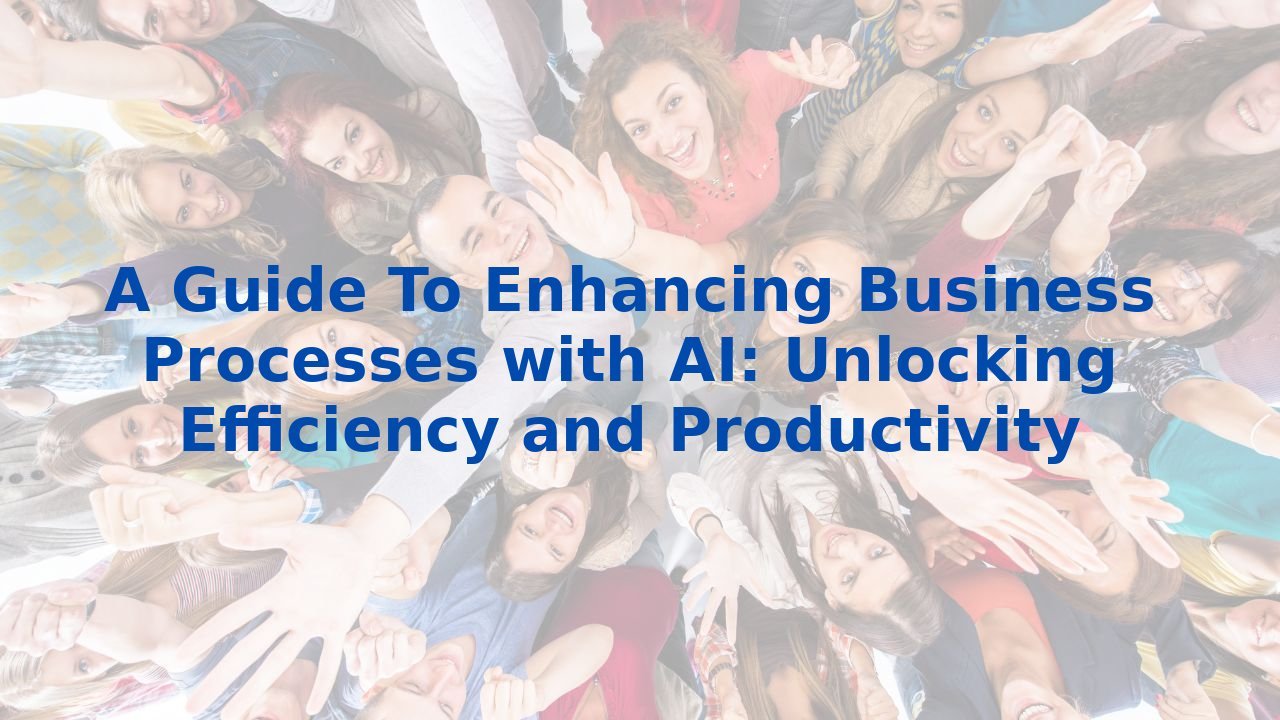A Guide To Enhancing Business Processes with AI: Unlocking Efficiency and Productivity
A Guide To Enhancing Business Processes with AI: Unlocking Efficiency and Productivity
Introduction to AI in Business Process Management
Artificial intelligence (AI) is no longer just a buzzword; it’s a game changer in the realm of business process management. Its transformative power is revolutionizing how organizations operate, enabling them to enhance efficiency, boost productivity, and improve quality across numerous functions. This blog post will explore essential business processes that AI can enhance and the considerable benefits of using AI to streamline operations.
1. Process Discovery and Optimization
One of the most significant contributions of AI is its role in process discovery and optimization. By harnessing the power of process mining, AI can sift through vast amounts of operational data to identify inefficiencies lurking in workflows. This analytical approach reveals bottlenecks and inefficiencies, allowing businesses to visualize their processes and implement targeted improvements. With AI's insights, organizations have the opportunity to redefine their processes and optimize their operations for maximum effectiveness.
2. Automating Routine Tasks
Imagine what your organization could achieve if employees were freed from mundane, repetitive tasks. AI excels at automating routine processes, handling data entry, customer service inquiries, and even inventory management with accuracy and speed. Utilizing advanced technologies like Robotic Process Automation (RPA), businesses can delegate these time-consuming tasks to AI systems, allowing human talent to focus on strategic and creative activities that drive the business forward.
3. Enhancing Decision-Making
Decision-making is a multi-faceted aspect of business that can significantly benefit from AI. With powerful predictive analytics, AI allows organizations to glean insights from vast datasets, leading to data-driven decisions. Business analysts can run simulations to assess the potential impact of various pricing strategies on profitability, allowing for informed decisions that align with company goals. Moreover, AI-driven risk models prepare teams for unforeseen challenges by simulating worst-case scenarios, ensuring readiness in the face of disruption.
4. Improving Customer Service
In today’s competitive landscape, customer experience is paramount. AI technologies enhance customer service by analyzing feedback, requests, and interactions. By recognizing patterns and preferences, organizations can tailor personalized marketing strategies that resonate with their audience. AI’s capability extends to automating ticketing systems, ensuring that customer inquiries are triaged efficiently, solely to the human agents as needed. This allows for a seamless experience that leaves customers feeling valued and understood.
5. Streamlining Workflows
Streamlined workflows are the lifeblood of productivity. AI helps simplify workflows by automating tasks that usually weigh down teams. Intelligent Document Processing (IDP) is one such example, allowing organizations to transform documents into usable data without manual entry. By automatically processing information, errors decrease, and productivity rises. With AI technologies working behind the scenes, teams can operate at peak performance, thus enhancing their overall output.
6. Enhancing Product Development Processes
Innovative product development is vital for any organization looking to thrive. AI supports this by facilitating generative design, which explores an array of possible designs based on specific requirements. This technology reduces development time while preventing costly prototyping mistakes. By integrating AI into product development, businesses can accelerate their timelines and adhere to market demands more swiftly.
Benefits of Training Employees for AI
Integrating AI is about more than just technology—it's about people. To unlock AI's full potential, investing in employee training is essential. Ensuring that team members understand and are comfortable working with AI tools is critical for effortless integration into workflows. Proper training fosters a culture where employees can adopt new responsibilities and roles, mitigating fears of job displacement. By equipping your workforce with AI skills, organizations not only improve operational effectiveness but also cultivate a sense of empowerment among employees.
Conclusion
AI is a transformative technology poised to redefine the way businesses function. From process discovery and automation to enhanced decision-making and improved customer service, AI paves the way for unparalleled efficiency and productivity. The journey does not end with implementation; organizations must prioritize employee training to get the most out of AI capabilities. Those embracing AI will unlock new opportunities for growth and remain competitive in an ever-evolving landscape.



